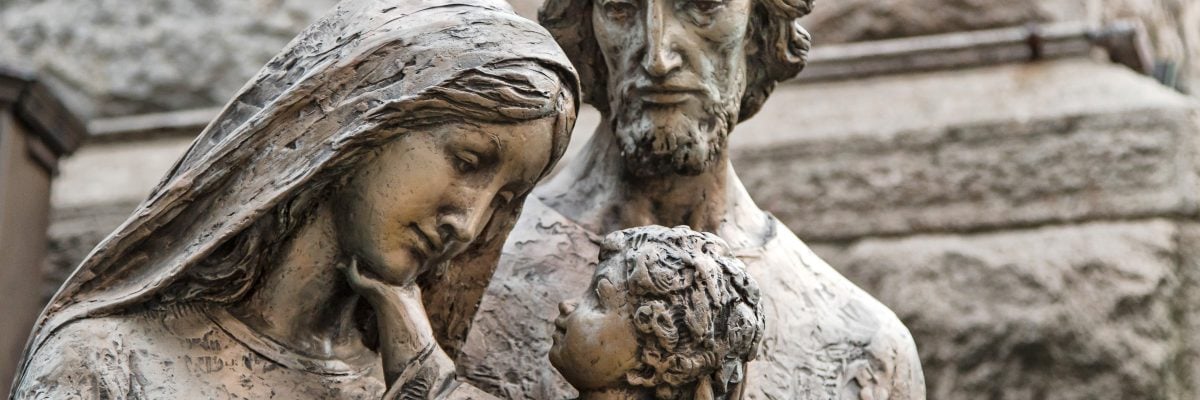
Homily for the Feast of the Holy Family
When the days were completed for their purification
according to the law of Moses,
They took him up to Jerusalem
to present him to the Lord,
just as it is written in the law of the Lord,
Every male that opens the womb shall be consecrated to the Lord,
and to offer the sacrifice of
a pair of turtledoves or two young pigeons,
in accordance with the dictate in the law of the Lord.The child’s father and mother were amazed at what was said about him;
and Simeon blessed them and said to Mary his mother,
“Behold, this child is destined
for the fall and rise of many in Israel,
and to be a sign that will be contradicted
—and you yourself a sword will pierce—
so that the thoughts of many hearts may be revealed.”
— Luke 2:22-40
“Mal commune, mezzo gaudio!” I heard this charming Italian proverb for the first time while waiting with an ever-growing crowd at a Roman bus stop. It means “a shared evil is half a joy.”
We had waited and waited, and as the bus became later and later people began to talk, first complaining about the delay, but then talking about everything else they had to put up with in the City. An aged henna-haired lady, who worked as a registrar, turned to me and repeated the proverb while rolling her eyes,. There were at least twenty people there, obviously enjoying their interactions occasioned by the inconvenience of city transport.
The proverb was true; in fact, the people probably had a more memorable and enjoyable afternoon than if the bus had arrived on time and they had boarded in their usual silent back-to-work-after-lunch resignation. As it was, the bus arrived packed to the ceiling, with another bus following, practically empty, but now on time. So there were plenty of seats, to boot. Mal commune, mezzo gaudio, indeed!
Now this is a fairly homely way to introduce the solemn, prophetic words of today’s Gospel, words that are more than proverbs, words that cut to the heart, as it were, of the drama of our day to day earthly existence: “And you yourself a sword shall pierce, so that the thoughts of many hearts may be revealed.”
The patient Job said it well: “Man that is born of a woman is of few days and full of trouble. He cometh forth like a flower, and is cut down; he fleeth also as a shadow, and continueth not.” Human life is tried by sorrows from its beginning until its end. And yet we all want to be happy, we all want to have joy. There must be some provisional method for dealing with daily trials and sorrows, whether great or small, acute or chronic.
“And you yourself a sword shall pierce, so that the thoughts of many hearts may be revealed.” St. Gregory of Nyssa tells us that these words do not mean Our Lady’s sorrows will reveal the sorrows of others, but rather that Our Lady’s and Our Lord’s suffering will provide the universal occasion for our understanding of human suffering. When we look upon their pains, we begin to see the sense of our own. Shared suffering, literally “com-passion,” does not take away our woes, but it surely lessens them, and even can give them their meaning. Suffering with another is a supreme occasion to express a genuine love, a love that seeks the good of the one loved rather than one’s own pleasure or advantage.
This kind of sympathetic love prepares us for true joys. In fact, we could scarcely appreciate the joys of our life together unless we saw them also in with the shadows of our misfortunes.
It is safe to say that the Holy Family was the happiest of families, even though it was a family that was tried beyond any other. The sufferings that accompanied their years together were the source of an ever-deepening love among them.
Sadly, many families let sorrows become a source of division, of dissatisfaction, of peevish disputes and touchy feelings. Jesus, Mary, and Joseph look upon us and move us by their prayers and example to use our sorrows well, as a source of the shared joy of mutual love. What can give more joy to a human heart, after all, than the security that no sorrow, no evil can leave us without the support of those around us? Just as we must not suffer alone, so too will our joys be shared in the inexhaustible happiness of heaven wherein lies waiting for us, not half, but the whole of our joy.



